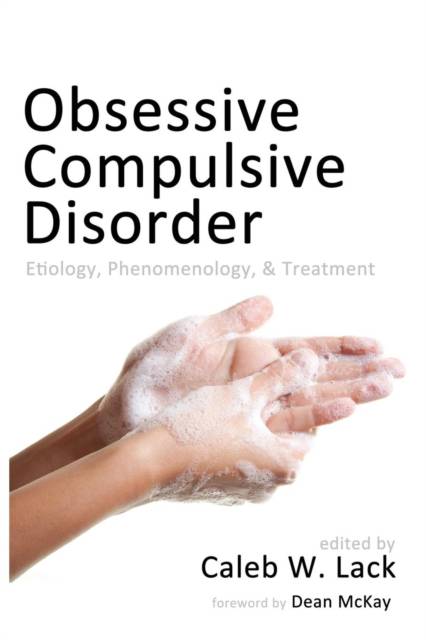
- Afhalen na 1 uur in een winkel met voorraad
- Gratis thuislevering in België vanaf € 30
- Ruim aanbod met 7 miljoen producten
- Afhalen na 1 uur in een winkel met voorraad
- Gratis thuislevering in België vanaf € 30
- Ruim aanbod met 7 miljoen producten
Zoeken
Obsessive-Compulsive Disorder
Etiology, Phenomenology, and Treatment
Paperback | Engels
€ 41,95
+ 83 punten
Omschrijving
Obsessive-Compulsive Disorder: Etiology, Phenomenology, and Treatment provides an introduction to the fascinating world of those with problematic obsessions and compulsions. Some of the world's leading researchers and clinicians contribute chapters to this volume, which covers everything from the causes of OCD, to how it manifests across different cultural settings, to evidence-based treatments. Both new clinicians and those experienced with the disorder will find useful information inside, as will those seeking to learn more for themselves or their family members.
Caleb W. Lack is a clinical psychologist and Associate Professor of Psychology at the University of Central Oklahoma. He specializes in training others in evidence-based treatment of mental health problems.
"Lack has assembled a terrific volume on OCD that is concise yet thorough. A must read for students, clinicians, and researchers... every chapter of this book is clearly written and the authors stick to the most up-to-date scientifically supported knowledge. The chapters on symptom dimensions in OCD and cultural manifestations of the disorder are highlights and make this book unique. It will occupy a prominent place on my bookshelf and become required reading for my students."
Jonathan S. Abramowitz, University of North Carolina at Chapel Hill
Caleb W. Lack is a clinical psychologist and Associate Professor of Psychology at the University of Central Oklahoma. He specializes in training others in evidence-based treatment of mental health problems.
"Lack has assembled a terrific volume on OCD that is concise yet thorough. A must read for students, clinicians, and researchers... every chapter of this book is clearly written and the authors stick to the most up-to-date scientifically supported knowledge. The chapters on symptom dimensions in OCD and cultural manifestations of the disorder are highlights and make this book unique. It will occupy a prominent place on my bookshelf and become required reading for my students."
Jonathan S. Abramowitz, University of North Carolina at Chapel Hill
Specificaties
Betrokkenen
- Uitgeverij:
Inhoud
- Aantal bladzijden:
- 206
- Taal:
- Engels
Eigenschappen
- Productcode (EAN):
- 9780992600051
- Verschijningsdatum:
- 14/02/2015
- Uitvoering:
- Paperback
- Formaat:
- Trade paperback (VS)
- Afmetingen:
- 152 mm x 229 mm
- Gewicht:
- 281 g

Alleen bij Standaard Boekhandel
+ 83 punten op je klantenkaart van Standaard Boekhandel
Beoordelingen
We publiceren alleen reviews die voldoen aan de voorwaarden voor reviews. Bekijk onze voorwaarden voor reviews.










